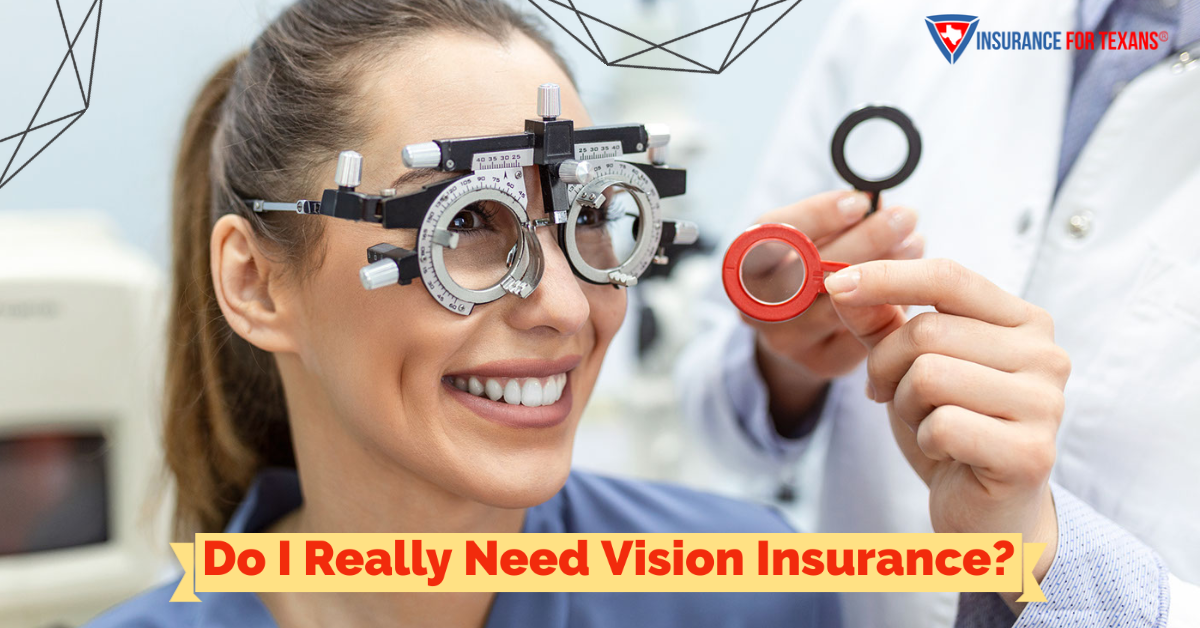One of the most often asked questions from Texans as they are looking to secure their individual health insurance plans when leaving employer-sponsored benefits is centered around whether or not they should also secure Dental Plans and Vision Insurance. This is one of the toughest questions for the agents at Insurance For Texans to answer because it is VERY subjective. Yes, glasses and contacts can be expensive. But does that mean that you should have vision coverage like you did when you are footing 100% of the entire bill. Let's take a look.
What is vision insurance?
Vision Coverage is often a misunderstood benefit that is included in employer-sponsored plans. It's typically a low cost item in that benefit selection process and since someone in the family generally needs either glasses or contact, it gets added on during selection. Vision plans offer different coverage options that cater to an individual or family's eye care needs. The monthly premiums can vary greatly when comparing group plans through an employer and individual plans that you secure privately. These plans cover a variety of services, from routine eye exams to corrective lenses. They can also provide coverage for certain types of elective procedures and preventive care.
Some items covered are:
- Routine Exams
- Frames
- Corrective Lenses including progressive, bifocals, and trifocals
- Contacts
- Preventive Care
Let's look at some specifics of these items.
Regular Eye Exams and Preventive Care
Regular, routine eye exams have a vital role in maintaining good vision health. Vision insurance plans typically cover annual comprehensive eye exams, which can detect early signs of eye diseases and other problems that can affect eyesight. These exams allow eye doctors to assess any vision changes, identify any underlying health conditions, and rule out any risk factors for eye diseases.
Most vision insurance plans offer an affordable copay for an eye exam, which falls in the range of $10-$20. Apart from this, preventive care, including vision tests and regular checkups, are also covered under most vision insurance plans. These regular checkups can help catch any potential eye problems early and are key to preserving both eye health and overall health.
While optometrists do not require vision insurance before administering an eye exam, the cost of seeing an eye doctor without insurance can be considerable. Vision insurance helps individuals minimize their out-of-pocket expenses for eye care, including routine eye exams. Without vision insurance, the cost of these exams can range from $100 to $200 per visit.
Having vision insurance can greatly impact an individual's vision-healthcare. It can help save money on preventive care, corrective lenses, and elective procedures. In addition, it also encourages individuals to schedule regular eye exams in order to keep their eyes healthy. Overall, vision insurance is essential for those with family history of eye diseases or those looking to maintain their perfect vision for years to come.

Does the plan cover corrective lenses and prescription eyewear?
Most vision insurance plans cover the cost of corrective lenses and prescription lenses, such as glasses and contact lenses. The coverage may vary depending on the type of lenses and frames chosen. Some plans may limit the number of frames or lenses that can be purchased within a certain time frame, while others may require a copay for certain items.
It is important to note that some plans may also have limitations on the coatings or enhancements that can be added to lenses, such as scratch-resistant coatings or transition lenses. Patients should review their plan's coverage to determine if there are any restrictions on the type of lenses or frames that can be covered.
Does the plan cover progressive lenses or contact lenses?
When searching for vision insurance coverage, it is important to consider whether the plan covers the cost for progressive lenses or contact lenses. These specialized lens treatments can significantly improve one's vision and quality of life, but they often come at a higher cost than basic lenses.
Some vision insurance plans may cover the cost of progressive lenses or contact lenses, but it is important to review the benefits carefully. Patients should look for any limitations or coverage types, such as a deductible, copay, or coinsurance, that may apply to these treatments.
Additionally, patients should consider the monthly premium they will be paying for their vision insurance plan. While some plans may provide coverage for progressive lenses or contact lenses, they may have a higher premium rate than plans that only cover basic lenses. The total cost of care between cash pay only or insurance premiums plus copays is more important than whether or not you have a vision plan in place.
Advantages of having vision insurance
Having vision insurance can provide numerous advantages to individuals and families. The monthly premiums paid towards vision insurance can reduce expenses associated with regular vision correction and eye exams. In fact, since most adults require some form of vision correction and an annual eye exam, making vision insurance a cost-effective option.
Comprehensive coverage provided by vision insurance plans includes exams, corrective lenses, and frames, which can help alleviate the financial burden of these expenses. Since individuals with a family history of eye disease may need additional exams and care, this can be a cost effective means of lowering out of pocket costs.
The type of coverage can also ensure that individuals can visit their network providers without worrying about the cost of eye care services. This type of coverage also extends to lens enhancements such as scratch-resistant coatings and transition lenses. Having this kind of coverage to help with eye care costs can provide peace of mind for Texans.
What about family plans?
When considering vision insurance, family plans offer numerous benefits. Children's vision can change frequently, requiring regular exams and new glasses or prescriptions. With a family plan, these costs can be covered without worrying about excessive out-of-pocket expenses.
Additionally, family plans can be a cost-effective way to provide eye care for everyone. Instead of purchasing individual plans for each family member, a family plan provides coverage for the entire household. This can save money in the long run while ensuring that everyone has access to essential vision services. This means that everyone in the family can receive vital preventive care without financial barriers.
How much does it cost?
When it comes to vision insurance, the cost of a plan can vary depending on various factors. Monthly premiums and out-of-pocket expenses are two crucial factors in determining the overall cost of the plan. Monthly premiums are the payments made to the insurance provider every month, while out-of-pocket expenses refer to the costs of covered services that are not fully covered by your vision insurance policy.
The cost of vision insurance plans can range from comprehensive benefits to bare-bones coverage. The overall cost of a plan will depend on the level of coverage chosen along with the types of vision services included. Family plans also have varying costs depending on the size of the family.
When determining the cost of the plan, it is important to carefully review what is covered and the types of services needed. Some vision insurance plans may cover preventive care, while others may offer more coverage for elective procedures or treatments for eye diseases. Health savings and flexible spending accounts can also be used to supplement coverage and reduce out-of-pocket costs.
If you are considering a bare bones type plan, you should review if it is truly an insurance policy or simply a vision discount plan. Some companies will charge a fee to offer a discount on a pair of frames or eye exam and call it a vision plan. This can be more expensive than just paying cash to your optometrist. So be careful.
Do I really need vision insurance?
Maintaining the health and wellness of your eyes can be very expensive. With coverage that may include routine eye exams, corrective lenses, and even surgeries, vision insurance can help save you money and ensure timely eye care.
Routine eye exams are a critical aspect of maintaining healthy eyes, and vision insurance can help cover the associated costs. Additionally, vision insurance can help alleviate the financial burden of corrective lenses, such as eyeglasses or contact lenses. Depending on your needs, vision insurance may also cover surgeries such as Lasik. Though it is worth noting that many vision insurance plans may offer additional coverage for elective procedures, such as LASIK surgery or lens enhancements like blue-vision coating. For many Texans, eye surgery would need to be covered by health insurance rather than vision plans
When Texans are deciding whether to pay for vision insurance, we always recommend totalling up how often you need eye exams and how much you spend on eye care. If you require regular eye exams or wear corrective lenses, vision insurance may be a cost-effective option. It is especially recommended if you have a family history of eye diseases or are at risk for developing such conditions. But we must also remind Texans that you may also be required to see a network provider for their vision care needs in order to receive full coverage. Out-of-network providers may result in higher out-of-pocket costs. And that causes problems for some folks.
In summary, vision insurance plays a crucial role in maintaining the health of your eyes and saving money on routine eye exams, corrective lenses, and surgeries. Consider your total annual cost of eye care needs when deciding whether to obtain vision insurance and consult with your eye care professional for guidance. If you would like to evaluate your options, whether it be for a basic plan or a more comprehensive one, the agents at Insurance For Texans would love to help you with that. Simply click the button below to get started.



